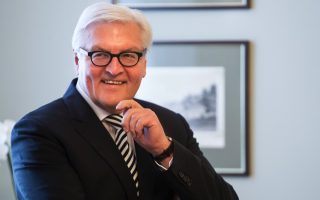As ‘gate of Europe,’ Greece is also an ISIS target

Europe needs to prepare for more attacks by Islamic fundamentalists and new types of attacks, warns the chair of the London-based International Institute for Strategic Studies, Francois Heisbourg, who is visiting Athens at the invitation of local think tank Network for Reform in Greece and Europe.
The global security expert stresses that as the “gate of Europe” for millions of asylum seekers and migrants, Greece is also at risk, as it can be a target as well as a transit point.
Given how Greece is expected to deal with “multiple threats with limited resources,” he says he would advocate a Europe-wide program to combat terrorism that would include cross-border cooperation in intelligence and asset sharing.
As a former special adviser on security issues to French presidents Nicolas Sarkozy and Francois Hollande, as well as a founding member of the Franco-German Defense and Security Council, Heisbourg talks to Kathimerini about the migrant crisis, the importance of the deal signed by Turkey with the European Union, the closure of the Balkan route and NATO’s role.
How serious a threat is ISIS to the West?
In approaching the threat from Daesh – I prefer to use the Arab acronym because the leaders of Daesh hate it because it sounds bad – we should not forget that jihadi terrorism existed long before Daesh gained the upper hand in Syria and Iraq three years ago. The terrorist acts of Al Qaeda – 9/11 remains by far the most deadly one-day terror operation – over close to a quarter of a century ago now are reminders that the collapse of Daesh’s territorial ambitions in the Middle East do not signal the end of jihadism. This doesn’t mean that the fall of the “caliphate” is not necessary; without the destruction of Daesh in Syria and Iraq, there can be no hope of reconstruction of these war-torn regions.
What is the best way to combat terrorism?
As far as Europe is concerned, we have to assume that there will be renewed jihadi attacks and some of them will involve new modes of operation. In order to prevent them or at least to limit their consequences we obviously have to build up cross-border cooperation between the intelligence and security services, and to reinforce shared EU assets such as Europol and most crucially the Schengen information system. We must also avoid making the mistake of misreading the nature of the threat.
In Europe, terrorism, whether of a jihadi nature or of ultra-right or left-wing extremist provenance, is a criminal enterprise, not the armed avant-garde of a broader social movement. On this question and for the time being, I am closer to Olivier Roy’s side of the argument (jihadism as an avatar of radicalism, to put it as simply as possible) than to Gilles Kepel. But Kepel may turn out to be right in terms of the future of jihadism in Europe. The risks of that happening will be all the greater if we treat the fight against jihadism in Europe as an insurgency, rather than with the tools of counterterrorism narrowly defined. Having worked on counterterrorism doctrine for close to 20 years, including during Emmanuel Macron’s campaign, I can assure you that this apparently academic debate has intensely practical consequences.
Is Greece at risk of becoming a target of Islamic fundamentalists?
Geography is destiny, and this epigram also applies to terrorism. Greece is one of the gates of Europe. Like France and others, you also know through bitter experience that terrorism on your territory has several faces, and you are fully aware that a country can be both a target in its own right and a point of transit. So you know the complexities. And you are facing these multiple threats burdened with limited resources. I wouldn’t be against a pan-EU program to finance the sharing of technical means and best practices in the field of counterterrorism. Such an initiative should go further than the project-by-project and purely upstream approach of the existing European security research program.
Do you see migrant flows into the Aegean rising?
The Aegean route was of limited importance before 2015 and it has returned to this status from 2016 onward. The main causes appear to have been, in descending order of importance, the tightening of the border between Syria and Turkey, the Turkish decision after the agreement with the EU to clamp down on the exit of refugees present in Turkey, the closing down of the Balkan route, and the NATO and other naval patrols in the Aegean. The first two factors can obviously change if Turkey changes its policy. For the time being, and as was the case before 2015, the biggest challenge is the central Mediterranean route, which serves as the entry point for African economic migration and refugee flows.
During a visit to Athens earlier this month, Emmanuel Macron outlined his vision for Europe. Do you think the recently elected French president will be able to strike the required balance with Germany?
The alignment of the political planets is quite remarkable. With the ongoing reform of the labor code, Macron is putting into place the first, big plank of his social and economic platform. We will know within a matter of weeks whether he has been successful in this enterprise, and if the answer is yes, the other reforms will follow. This will re-establish the trust lost with Germany under Sarkozy and Hollande.
For its part, Germany, after its elections, will need several weeks or months to put together a coalition. This means in practice that by the end of the year the leaders of the two most important European would be in a position to engage in a serious discussion on the transformation of the European Union. Such a discussion will not be easy, but one must not forget that historically the strength of the Franco-German relationship flows not from the proximity of the two countries’ starting position but from their ability to bridge the gaps between themselves. This was the case between a federalist Adenauer and de Gaulle’s Europe des Patries, or between Mitterrand and Kohl. This implies a high level of mutual trust.
Of course, the prospects will look much darker if Macron fails during the autumn, and/or if Germany has trouble putting together a coherent coalition.
What are your views on the Kurdish referendum for independence?
In life, there is what one wants, there is what would be equitable, and there is reality. The Kurds form a nation whose inhabitants are concentrated in four countries – Turkey, Syria, Iran and Iraq – which don’t want to lose substantial chunks of their territory. Furthermore, these countries are located in the most violent region of the world, the Middle East. In such circumstances, and without the benefit of a powerful protector from outside the region, an independent Kurdish state cannot be expected to survive.





